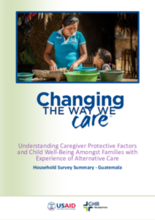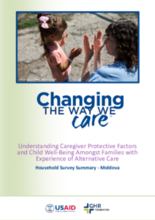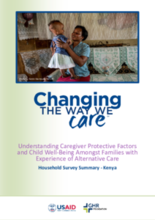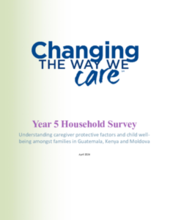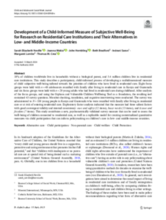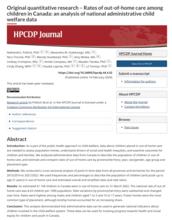Displaying 11 - 20 of 565
In this workshop panelists explored UNICEF's Data and Analytics Section's protocols and tools for gathering data on children in residential care.
In Guatemala, the survey in 2023 targeted all families who had participated in a case management process with CTWWC due to a reintegrating child or a child identified as at risk of separation, as well as a sample of households where the caregiver had attended a parenting school.
This is a summary of a household survey conducted in Moldova by CTWWC to provide insights for policymakers and practitioners on the impacts of interventions to support reintegrating families and those at risk of separation. For Moldova, CTWWC adapted its survey tool to fit the local context by adjusting terminology and phrasing of some questions and responses, and removing questions that were not relevant.
A key feature of CTWWC’s theory of change is building evidence on children's care and reform, particularly regarding reintegration from residential care, transitions to family-based care, and preventing separation.
The Changing the Way We Care (CTWWC) initiative conducted its Year 5 Household Survey as part of its commitment to building evidence around outcomes for children and families in the context of care reform. The second round of this survey in Kenya and Guatemala, and first round in Moldova, aimed to understand the impact of CTWWC interventions on children and families transitioning from residential care to family-based alternatives or receiving support to prevent separation.
This study describes a participatory, child-informed process of developing a multidimensional measure of child subjective well-being tailored towards the priorities of children who have lived in residential care. The survey was administered to 180 young people in Kenya and Guatemala who were reunified with family after living in residential care or at risk of entering residential care.
In Matters of Significance, Marinus van IJzendoorn and Marian Bakermans-Kranenburg draw on 40 years of experience with theoretical, empirical, meta-analytic and translational work in child development research to highlight the complex relations between replication, translation and academic freedom. They argue that challenging fake facts promulgated by under-replicated and under-powered studies is a critical type of translation beyond technical applications.
The authors analyzed administrative data from Canada to describe the population of children in out-of-home care, and estimate and compare rates of out-of-home care by province/territory, year, sex/gender, age group and placement type.
This publication is meant to guide the collection of reliable, internationally comparable data on key ECD indicators, the selection of which was informed by the Nurturing Care Framework.
This report provides an in-depth analysis of the situation of children in alternative care and in adoption in Europe and Central Asia (ECA) based on available data from TransMonEE, as well as other sources such as MICS, DataCare and the Conference of European Statisticians (CES). It marks the first analysis of data on children in alternative care by the UNICEF ECA Regional Office since the publication of the ‘At home or in a home’ report in 2010, highlighting the developments and challenges in collecting and reporting data on children in alternative care and adoption and summarises recommendations derived from recent data review initiatives.

